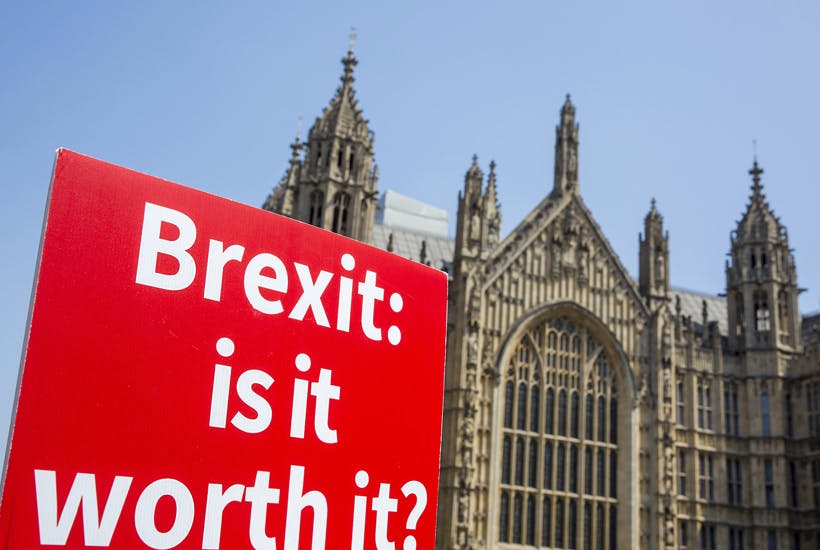The latest stage in a series of arcane gambits and cunning plans designed to frustrate Britain’s exit from the EU came in the form of Jeremy Corbyn’s recent letter to leading opponents of a no-deal Brexit, inviting them to discuss the joint coordination efforts.
In his letter, Corbyn rightly predicts that during the next few weeks the country will enter a ‘constitutional and political storm’. Up to now, however, the response of our political elite to this impending crisis has been confused.
Radical Leavers claim Parliament can be prorogued to allow a no-deal Brexit to pass without further intervention from MPs. Lib Dems and Labour have argued over who should lead a caretaker anti-no-deal government that might follow a successful vote of no confidence in the Johnson government. Downing Street, however, believes that even after losing such a vote, the Prime Minister can scupper this scheme by calling a general election that would be held after the Brexit date has passed.
Throw in questions about the role of the monarch and what civil servants are allowed to do during an election campaign and we have the political equivalent of the Gordian Knot, one which has foxed experienced parliamentarians, commentators and constitutional experts. But if the inhabitants of Westminster and Whitehall struggle to think themselves out of this conundrum, what of ordinary Brits?
It is sobering to realise that Britain has only been a democracy based on one person one vote since the 1948 Representation of the People Act abolished plural voting. In historical terms, this is the blinking of an eye. The Act was the culmination of a process that began when the 1832 Reform Act enfranchised some middle-class men. It was, nonetheless, only after the 1867 Reform Act extended the vote to better-off members of the working class that MP Robert Lowe sounded the alarm bells.
‘We cannot’, he argued, ‘suffer any large number of our citizens, now that they have obtained the right of influencing the destinies of the country, to remain uneducated… it is a question of self-preservation – it is a question of existence, even of the existence of our constitution…’
In other words, the elite needed to ‘educate our masters’ into the ways of parliamentary democracy.
This, quite simply, did not happen. Instead, the parties sought to control and cajole the electorate in various ingenious ways, exploiting their ignorance through simplistic slogans pasted on posters to dubious claims made via much-shared nicely-produced Facebook links. This came to a head in the Brexit referendum, with Project Fear on one side and NHS buses on the other. Both sides trying to push and pull, rather than persuade, Brits towards voting Remain or Leave.
Instead of taking the lead themselves, politicians have left political education to ill-resourced voluntary societies, most notably the Hansard Society, which since 1944 has done its best to enlighten the public about the working of Parliament. It is only very recently that Parliament itself has taken outreach work seriously. But the numbers these activities involve are limited to a few thousand.
If unable to do much to ‘educate our masters’, since 2004 Hansard has published an annual survey of what the public think about politics. And the picture has been consistently grim.
The 2018 audit revealed an increasing disengagement and disenchantment with parliament. These popular feelings are, however, not based on a firm grasp of how politics works: only 46 per cent told Hansard they believed they had a sufficient knowledge of Parliament. But this does not mean that even this supposedly informed minority group actually understands parliamentary democracy. A recent YouGov survey found that only seven per cent of the public believed MPs were elected to exercise their own judgement – the correct position – rather than simply to do their constituents’ bidding.
That so few appreciate possibly the most basic characteristic of British parliamentary democracy is, to say the least, concerning. It is a misunderstanding that arguably lies at the heart of the rise of populism, which seeks to cut through the inevitable complexity of democracy by casting parliamentarians as the enemy of the people.
There is then a crisis even more intractable than the current one over Brexit. But this is not one our political elite looks likely to want to solve any time soon. For when political parties talk of ‘education’ they really mean propaganda for their own policies. When they speak of ‘democracy’ they actually mean the victory of their own causes.
But whether Britain leaves or remains, anybody concerned for the health of democracy needs to seriously address this issue. This is, of course, a call almost as old as parliamentary democracy itself.
But with Johnson’s Conservatives and Corbyn’s Labour embracing, rather than rejecting, simplistic policies and easy solutions, the prognosis for the education of our masters is as bleak than ever.






Comments